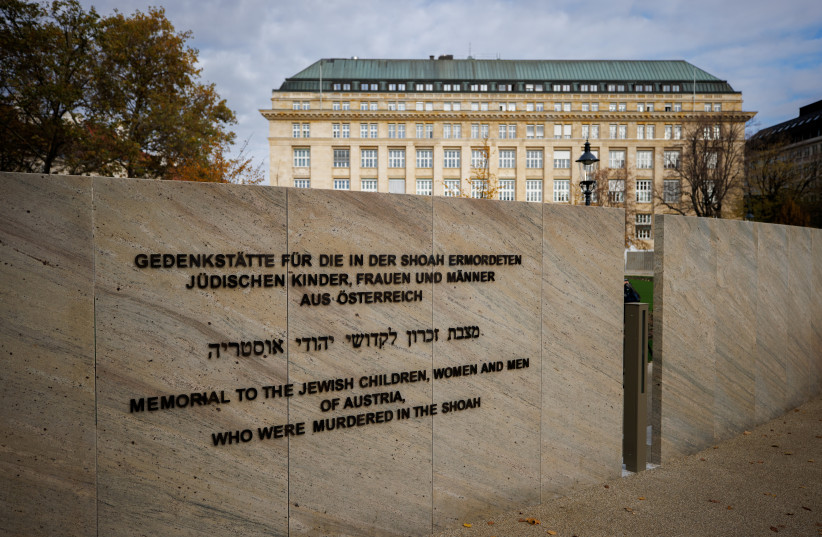The inauguration of the Shoah Wall of Names, engraved with the names of some 64,440 Austrian Jews who were murdered or perished during the Holocaust, took place in Vienna on Tuesday, the 83rd anniversary of Kristallnacht.
It is the first state-funded Holocaust memorial to include the names of the victims and is located in a prominent area of central Vienna.
Although there is an existing Holocaust monument in the Austrian capital, the Judenplatz Holocaust Memorial, it’s design is ambiguous and does not include the names of the victims.
The inauguration ceremony at Ostarrichi Park was attended by Chancellor Alexander Schallenberg. Israel Ambassador Mordechai Rodgold; Hannah Lessing, secretary-general of the National Fund of the Republic of Austria for Victims of National Socialism; Holocaust survivors Vienna Mayor Michael Ludwig; Oskar Deutsch, president of the Jewish community of Vienna; Jewish community leaders and other dignitaries; as well as Diaspora Affairs Minister Nachman Shai and descendants of survivors of the families of murdered Jews.
"This new memorial is different than the existing one at Judenplatz: The family names on the wall not only give the relatives of Jewish Shoa victims a place to commemorate their family’s individual fate in a central and public square in Austria’s capital, Vienna. It also makes clear that the Shoa is nothing anonymous, nothing abstract, but took the lives of more than 64.000 Austrian Jews,” said Deutsch, speaking at the event.
“[It is] a memorial to mourn, commemorate and remind ourselves of what has happened and what can never happen again."

Austrian President Alexander van der Bellen, who was scheduled to attend, was unable to do so because his secretary has been diagnosed with COVID as a result of which the president is in quarantine.
Last month, as a prelude to Tuesday’s event the mayor unveiled an exhibition at Vienna’s Central Train Station, marking the 80th anniversary of deportations of Jews from throughout the German Reich. The first transport left Vienna on October 15, 1941.
The exhibition serves as a reminder of a grim period in Austrian history, and is yet another indication that a series of Austrian governments are accepting responsibility for the past, and are ensuring that the lesson will be passed to future generations.
The Republic of Austria designated 2018 as a Year of Remembrance and Reflection and decided to create a memorial to Holocaust victims who were Austrian citizens.
The memorial, like the exhibition at the train station, is designed to foster awareness of where evil can lead, and to provide a place where tribute can be paid to the memories of men, women and children who lost their lives for no reason other than the fact that they were Jews.
It is a place where today’s Austrians can reflect on the atrocities and lack of basic human compassion that characterized a generation of the not so distant past and where the generations of tomorrow can learn the lesson of Never Again.
The National Fund has for several years supported endeavors for the creation of a monument whereby victims of the Holocaust could be remembered by name and not just as a numerical statistic. The Shoah Wall was created at the initiative of Austrian-born Holocaust survivor Kurt Yakov Tutter and the Association for the Erection of a Shoah Wall of Names.
Construction began in the summer of 2020 and was completed in October of 2021.
Earlier in the day on Tuesday, EJC president Dr. Moshe Kantor presented a comprehensive study geared to defeating antisemitism.
The study was conducted under the patronage of Austrian National Council President Wolfgang Sobotki, the City of Vienna and the EJC.
The five-volume study resulted from a high-level conference held in Vienna in 2018, after which some of the leading minds of the University of Vienna, New York University, Tel Aviv University and the EJC came together to brainstorm over an end to antisemitism, which is the title of the study.
Speaking at the Liechtenstein Palace, where the publication of the study was officially released, Kantor described it as the most ambitious study of the problem of antisemitism. He emphasized that it details the groundwork for united, connected and preventive action.
The EJC intends to distribute the study as widely as possible so it can be used by governments, academic and religious institutions, the media and others.
The study represents the combined thinking of 120 international experts of different nationalities, faiths and professions, including Katharina von Schnurbein, the European Commission coordinator on combating antisemitism.
At the unveiling of the Wall of Names, Schallenberg said behind every name there was a person and behind each person a history.
He said Austria must not ignore the fact that there were Austrian collaborators who helped to seal the fate of these Jews.
What happened during the Holocaust still defies understanding, he said.
Shai, who is on an official visit to Austria and who attended the ceremony, also attended Austria’s national Holocaust Remembrance Day ceremony at the Judenplatz in Vienna Tuesday morning.
Following the event, Minister Shai spoke with President of the National Council, the lower house of Austria’s parliament, Wolfgang Sobotka, and warned against the rising tides of antisemitism.
“Hate against the Jewish people has taken on new and vicious forms throughout Europe and the world in recent years… Antisemitism is not an issue that Israel, nor the greater Jewish people can solve alone. It is the responsibility of nations and institutions around the world to take action,” said Shai.
“The State of Israel appreciates the commitment of the Austrian government to preserve Jewish life through its investment in community security and adoption of a national strategy to combat antisemitism. We will work in partnership with you to ensure that Austria – and all of Europe — is a place where the Jewish people can live fully and securely.”
